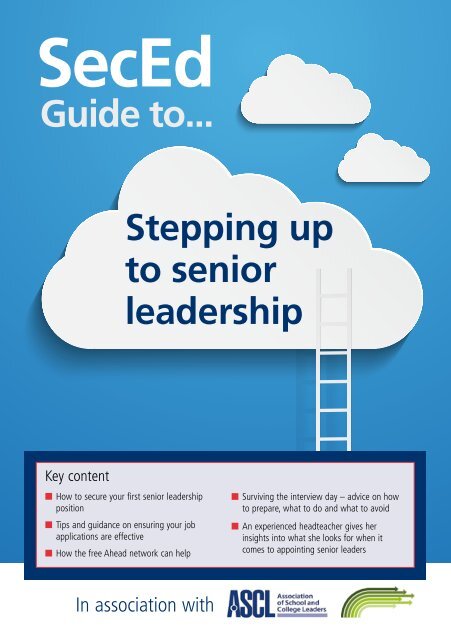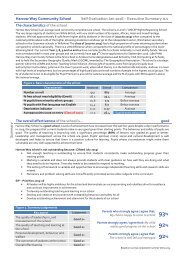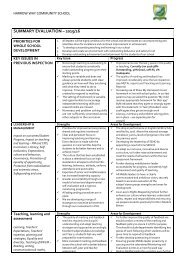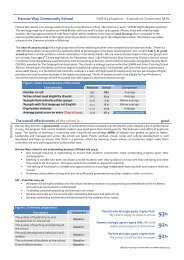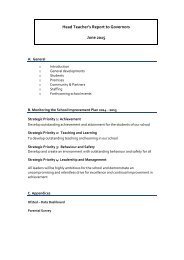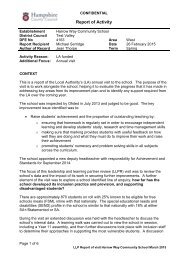You also want an ePaper? Increase the reach of your titles
YUMPU automatically turns print PDFs into web optimized ePapers that Google loves.
<strong>SecEd</strong><br />
Guide to...<br />
Stepping up<br />
to senior<br />
leadership<br />
Key content<br />
n How to secure your first senior leadership<br />
position<br />
n Tips and guidance on ensuring your job<br />
applications are effective<br />
n How the free Ahead network can help<br />
n Surviving the interview day – advice on how<br />
to prepare, what to do and what to avoid<br />
n An experienced headteacher gives her<br />
insights into what she looks for when it<br />
comes to appointing senior leaders<br />
In association with
Guide to...<br />
Stepping up to senior leadership<br />
The step from middle to senior leadership can seem like a huge<br />
leap. So how do you know when you are ready to begin applying,<br />
and what should you do to achieve your promotion?<br />
Knowing you are ready for promotion<br />
When you are comfortable in your middle leadership<br />
role, have taken on additional responsibilities such as<br />
a particular whole-school project, and feel a need to<br />
broaden your professional perspectives, then it might<br />
be time to consider senior leadership.<br />
One of the big differences between middle and<br />
senior leadership is that you will be managing a<br />
particular area of school life, such as the curriculum,<br />
or behaviour and attendance, rather than a team of<br />
people as head of department or year.<br />
Your suitability for a promotion might be<br />
something you can discuss with a member of your<br />
school’s senior leadership team, who will be able to<br />
guide and support you with taking the next step.<br />
If you do plan to apply for a new post, it would<br />
be appropriate to inform your headteacher of your<br />
intentions.<br />
Applying for posts<br />
Applying for internal or external promotion is not<br />
that wildly different, except that if you want to<br />
remain in your own school then your aptitudes,<br />
strengths and weaknesses will already be known to<br />
colleagues.<br />
Every school will want to find the right person<br />
for the job, so if you are applying from within<br />
you should not assume you will automatically<br />
be successful, even if you are the only internal<br />
candidate.<br />
Most schools still use application forms, although<br />
you should check with the advertisement to find<br />
out how you should apply. Some schools may just<br />
request a CV and covering letter in the first instance.<br />
How you complete your application form is<br />
crucial in getting yourself in front of an interview<br />
panel. It always sounds obvious, but spelling,<br />
grammar and punctuation should be checked<br />
and double-checked to ensure it is correct.<br />
Mistakes will reflect badly on you. Make sure that<br />
all the information you give is up-to-date, accurate<br />
and correct.<br />
‘Write what you think the<br />
issues and the challenges<br />
are, and how you<br />
’<br />
would<br />
deal with them<br />
You will almost certainly be asked to provide a<br />
covering letter, in which you may need to address a<br />
question set by the headteacher or governors. This<br />
will usually be related to an aspect of the role that<br />
you are applying for. In the case of an assistant or<br />
deputy head, you might be asked to write about<br />
curriculum development, as an example, and how<br />
you might take on this task in the light of current<br />
education policy.<br />
Richard Fawcett, an ASCL consultant who<br />
works with schools on recruiting senior managers,<br />
explained: “Whatever the topic you have been<br />
asked to write about, ensure you answer it fully.<br />
Stick to that subject and don’t stray into other areas.<br />
“Amazingly, we still see application forms and<br />
letters that are generic in nature, that fail to address<br />
the question the school has set, and which have<br />
clearly not been written with that particular post in<br />
mind.<br />
“Write what you think the issues and the<br />
challenges are, and how you would deal with them.<br />
<strong>SecEd</strong>
You can refer to the school’s Ofsted report, for<br />
example, as this shows you have read it. But be<br />
positive, and don’t write anything derogatory about<br />
the school if its last inspection fell short.<br />
“For example, ‘I am not surprised this school is<br />
in special measures, because...’ is not appropriate.<br />
However, you can say that you are aware there<br />
are challenges and outline how you would help to<br />
address them.<br />
‘A running theme<br />
through the whole<br />
application process is<br />
giving examples of the<br />
impact you have had in<br />
your existing role. Even if<br />
this didn’t always work, it<br />
shows you are learning<br />
from the experience and<br />
are willing to be flexible<br />
and proactive in your role<br />
’<br />
“You have to start from scratch with every<br />
application you make. Do not take short cuts by<br />
cutting and pasting from previous applications<br />
because this stands out a mile. I have seen letters<br />
with the name of another school at the top because<br />
the applicant has forgotten to change it.”<br />
Lay out information in the way you are asked to,<br />
for example by providing details of your most recent<br />
post first and working down. Make sure you sign<br />
and date the form.<br />
If the advertisement states that the application<br />
should be sent to the head, or the chair of<br />
governors, ensure it goes to that person and not<br />
just to the care of the school. Use special delivery<br />
to be sure that the application arrives and on time.<br />
Call the school to check that it has arrived.<br />
Mr Fawcett continued: “The most important<br />
thing to remember is that it is clearly laid out and<br />
well-presented and that it is accurate and truthful.<br />
Explain any gaps in service which need to be<br />
explained, so that the school does not jump to<br />
conclusions.<br />
“Most people who get turned down at the<br />
application stage do so because their application is<br />
a mess or inaccurate, and not necessarily because<br />
they are unsuited and unqualified for the role.”<br />
Chris Holmwood, the senior deputy head and<br />
principal of the Leadership and Training Centre at<br />
Shenley Brook End School in Milton Keynes, which<br />
runs middle and senior leadership training courses,<br />
said it was worth finding out about the school<br />
before application, and certainly prior to interview.<br />
“If you are to leave your school for a promotion<br />
then it is important you go somewhere where<br />
you will flourish, and where your educational<br />
philosophy will be shared and valued,” he said.<br />
“This information will be most important in the runup<br />
to interview.”<br />
Attending the interview<br />
Your application was impressive and you have<br />
been selected for interview. Selection days can<br />
be demanding on your energy and enthusiasm.<br />
Everything you do once you arrive at the school<br />
counts towards whether or not you will get the job.<br />
Start the day well by arriving on time and being<br />
properly turned out. Many schools are now relaxed<br />
about teachers’ attire during a working day, but you<br />
will be expected to set a standard at interview. Be<br />
polite to whoever you meet and turn off your mobile<br />
phone.<br />
If you have applied for an assistant or deputy<br />
head’s role, then you can expect an interview panel<br />
made up of the head and/or another senior leader, a<br />
representative from the governing body and possibly<br />
from the local authority too. Try to remember who is<br />
who and address them appropriately.<br />
Your answers to the panel’s questions should be<br />
succinct and aimed at the person who asked it. Try<br />
to back up your answers with evidence of your own<br />
experience in this area. If you don’t understand a<br />
question don’t be afraid to ask the interviewer for<br />
clarification.<br />
Mr Holmwood continued: “An interview is a<br />
two-way process and an opportunity for you to<br />
demonstrate what you can do, but also to explore if<br />
the school is right for you. Show you are aware of the<br />
<strong>SecEd</strong>
wider educational landscape and how that affects<br />
the school and has an impact on leadership, and<br />
what opportunities it presents.<br />
“A running theme through the whole application<br />
process is giving examples of the impact you have<br />
had in your existing role. Even if this didn’t always<br />
work, it shows you are learning from the experience<br />
and are willing to be flexible and proactive in your<br />
role.<br />
“If there is something significant you need to<br />
discuss, but it appears not to form part of the<br />
structure of the interview, then politely ask if you<br />
can talk about this issue.”<br />
Do not deprecate your existing or previous<br />
school or colleagues, and use humour carefully.<br />
Be constructively critical about the school you<br />
are applying to if asked how you would change<br />
something. Be careful, too, of becoming aggressive<br />
if the questions are uncomfortable or difficult to<br />
answer. If you can’t answer a question straight<br />
away, ask to come back to it later.<br />
The interview panel is likely to tell you on the<br />
day whether or not you were successful.<br />
I got the job!<br />
Congratulations. However, wait until you receive<br />
a firm offer in writing, with details of your salary<br />
and contractual arrangements, and the terms and<br />
conditions of the role. You will also now need to tell<br />
your school that you plan to leave and take up a<br />
new post. There are three windows of opportunity<br />
for resignation every academic year for senior<br />
leaders, which fall roughly at the end of each term.<br />
I didn’t get the job<br />
As disappointing as it can be not to get a muchcoveted<br />
job, the experience offers an opportunity for<br />
reflection for the future. Most interview panels will<br />
give feedback on your performance at some point<br />
afterwards. Leave it a few days if possible so you are<br />
feeling less raw and do not take any comments the<br />
wrong way. If your appointment was to be internal,<br />
and a colleague got the job, be magnanimous<br />
despite your disappointment. You will have to<br />
continue working with them, for the time being<br />
at least.<br />
‘Your answers to the<br />
panel’s questions should<br />
be succinct and aimed<br />
at the person who asked<br />
it. Try to back up your<br />
answers with evidence<br />
’<br />
of<br />
your own experience<br />
Also, take time to consider who is providing<br />
your references and whether they will be entirely<br />
supportive of your promotion.<br />
It is important to realise that you cannot be<br />
successful on every occasion, and disappointment<br />
now could lead to better opportunities in the future.<br />
For the time being, consider the whole experience<br />
as a useful learning curve and practice for your next<br />
interview.<br />
The Ahead network<br />
ASCL’s Ahead network is building a community<br />
where future leaders can begin to share ideas<br />
and experiences outside of their own schools and<br />
colleges. Membership is free to any middle leader<br />
who is keen to develop his or her leadership skills.<br />
For more details, see the back page of this Guide.<br />
CPD for aspiring senior leaders<br />
• Friday and Saturday, January 30 and 31<br />
(residential): Heading for senior leadership,<br />
Kenilworth.<br />
This Guide To... has been produced by <strong>SecEd</strong> with support from the Association of School and<br />
College Leaders, the only professional association and trade union to speak exclusively for<br />
secondary school and college senior leaders. ASCL membership is now more than 18,000 and<br />
growing. Its members receive legal cover and support, an advice hotline, guidance and resource<br />
materials, updates on the latest education news, and commercial discounts. Visit www.ascl.org.uk<br />
<strong>SecEd</strong>
What are heads looking for?<br />
Interview day is no less nerve-wracking for a<br />
prospective senior leader than an NQT going for<br />
their first job. But the stress and uncertainty can<br />
be alleviated by knowing what to expect and<br />
what qualities and attributes the headteacher and<br />
interview panel will be looking for.<br />
Carolyn Roberts, head of Thomas Tallis School<br />
in Greenwich, has interviewed candidates for<br />
a total of 45 middle or senior leadership posts<br />
during her 15 years as a headteacher (of three<br />
different secondary schools).<br />
Experience is, of course, a crucial aspect when<br />
looking at a candidate’s suitability for such a role.<br />
However, Ms Roberts also looks at an applicant’s<br />
qualifications, even when they have had many<br />
years in the profession. And as her school has a<br />
large 6th form, experience of working in a<br />
6th form environment is also crucial.<br />
A well-structured letter of application that<br />
answers whatever questions the applicant has<br />
been set is vital to getting called to interview. Ms<br />
Roberts explained: “The question would obviously<br />
be relevant to the post being applied for and I<br />
would want to see a clear answer to the question.<br />
I don’t want applicants telling me how marvellous<br />
they are, but what they have learned through<br />
their experience. Nor would I be interested in<br />
educational jargon – for example, a candidate<br />
telling me that they are a collegiate leader.”<br />
On interview day, candidates can expect to be<br />
met by the head and told what structure the day<br />
will take. This will be the head’s first impression,<br />
so the applicant should ensure they arrive in<br />
plenty of time and look the part.<br />
The first half of the day is likely to involve<br />
a number of tasks and activities, which will<br />
almost certainly include teaching a class. Ms<br />
Roberts added: “We would expect a senior<br />
leader regularly to deliver outstanding lessons,<br />
though we would not necessarily be looking for<br />
this during the 30-minutes we observe them.<br />
But they will need to show they are capable<br />
and demonstrate that they can form a working<br />
relationship with young people very quickly.”<br />
Another task might be an in-tray exercise,<br />
where candidates are presented with a list of<br />
10 things that have happened unexpectedly in<br />
school that morning that they need to put in<br />
order of priority. Here, they will be expected to<br />
demonstrate their delegating skills as well as how<br />
they might deal with urgent situations themselves.<br />
There may also be a data-recording test, where<br />
candidates are given a print-out of aspects of the<br />
school’s performance, which they are expected<br />
to analyse. Applicants who do not perform well<br />
in these activities are unlikely to progress to the<br />
interview.<br />
The interview process itself will be a discussion<br />
on a number of issues. How well the applicant<br />
taught their lesson will feature, as well as<br />
a discussion about issues relating to school<br />
leadership, such as how to deal with difficult<br />
colleagues, the applicant’s organisational skills,<br />
and how to lead by example.<br />
“We would also be looking at whether<br />
candidates had bothered looking at the school’s<br />
website and read the latest Ofsted report,”<br />
said Ms Roberts. “It might seem obvious but<br />
it’s amazing how many applicants turn up not<br />
knowing what our ethos is or what the school’s<br />
priorities are.”<br />
Further questions might include safe-guarding,<br />
and finding out more about the candidate: “Safeguarding<br />
is obviously crucial, so I’d want to know<br />
when they last did any training in this, rather than<br />
how they would deal with certain situations. And<br />
for me it’s important to know about the person. I<br />
want to know what gets them excited about their<br />
subject – so if I’m recruiting a history specialist I<br />
might ask which period of history interests them<br />
most. I also always ask what they’re reading. The<br />
only wrong answer to this question is ‘nothing’<br />
or that they don’t have time. I want to strike<br />
up a conversation about the recent book or<br />
article they’ve read. I don’t want to know about<br />
educational reports or blogs. That’s work, and it<br />
isn’t going to help me get under their skin and<br />
find out what motivates them as a person.”
Ahead: ASCL’s free support network for<br />
ambitious middle leaders<br />
Enthusiastic and ambitious middle leaders are the future of our education<br />
system. Are you thinking about taking that next step into senior<br />
leadership? If so, let ASCL help you to achieve your goal. Join ASCL’s free<br />
support network especially created for middle leaders and let us help you<br />
on your journey to senior leadership.<br />
Membership to the network includes:<br />
l access to dedicated web pages consisting of advice, guidance<br />
and resources<br />
l a monthly email newsletter<br />
l useful ASCL publications, including our flagship member<br />
magazine – Leader<br />
l early notice of relevant ASCL Professional Development courses<br />
l a free place at the spring middle leaders seminar<br />
l opportunities for networking with colleagues<br />
ASCL also provides support for schools that may want their middle leaders<br />
to engage in a programme of bespoke professional development.<br />
To register on the network or to find out more about our package for<br />
schools, see online at www.ascl.org.uk/ahead


